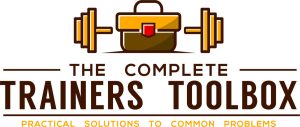Mental Skills for Big Lifts (And small ones too!)
Today’s guest post comes courtesy of Lisa Lewis, EdD, CADC-II, Licensed Psychologist, and co-contributor for The Complete Trainer’s Toolbox, which she’s loaded chock full of awesome Jedi Mind Tricks to help take your mental strength to the same level as your deadlift.
*****
Not that long ago, my husband was preparing to attempt a 600lb deadlift. He had been working toward this goal for some time, and as the big day approached, I noticed him expressing mostly anticipation, but also some doubt. Physically, he was prepared. But mentally, there were thoughts and feelings that were getting in the way of his well-earned confidence and excitement.
As a licensed psychologist and performance consultant, I offered my assistance. Although weight training, and exercise overall, is physical, psychological skills and habits strongly influence motivation, persistence, effort, and performance. Whether you are a trainer, coach, or a fitness enthusiast, you know that your thoughts, feelings, and expectations strongly influence how things go in the gym.
The psychological, or mental skillsthat I reviewed with my husband were brief, and focused on the goal of picking 600 pounds up from the ground. These very same techniques can be useful to you, and/or your clients, when doubt, worry, or even anxiety are getting in the way of specific achievements, or fitness progress in general.
Here is a quick summary of three easy approaches to decreasing performance anxiety and practicing mental preparation for big (or even small) lifts:
- Review the data:
What have you done to prepare for this goal? Have you completed your sets? Reps? Have you progressed your weight? Performed variations of the deadlift? Gotten in the requisite volume?
(To all of these questions, my husband answered, “Yeah!” He recognized that he had done everything he needed to, in order to pull 600lbs off the ground.)
- See the moment:
What will it be like when you pick up 600lbs? What will you do just before? Where will you be? Will anyone be there? Will you film it? What will you be feeling? What will you be wearing? What will be your routine, your process for going to the bar, and picking it up? Walk me through the execution of the lift… What will it feel like after you put the bar back down?
(This narration of the day, it’s circumstances, and the routine helped to visualize success, and work out some of the details, so that perfect execution seemed likely.)
- Imagine the worst:
What’s the worst that could happen? And if that happened, what would that mean about you? How would you feel? What would you do after that?
(In the face of anxiety, imagining the worst possible outcome can often remind us that failure isn’t really that terrible, and can often be the next step in the process of success. Walking through the worst-case-scenario with my husband removed the anxiety – and put into perspective the long game – which is to get strong, and stay that way.)
As you’ve probably already guessed, my husband did indeed deadlift 600 lbs. The physical preparation got him there, but the mental preparation relaxed, focused, and energized him, so that he could accomplish what he was ready for. These easy-to-use mental strategies can be useful to all coaches and clients, at all levels of fitness!
Add Psychological Skills to your fitness Toolbox
Your training and physical preparation is central to your goals in the gym, but mental preparation and mental skills enhance your performance, and remove psychological barriers from getting in the way of your achievements.
In the Complete Trainer’s Toolbox, I add mental skills training to the variety of exercises, assessments, and physical skills provided by strength coaches, trainers, and physical therapists. In the Complete Trainer’s Toolbox, I offer a one hour lecture on motivation, covering it’s nature, varieties, and techniques for enhancing and sustaining motivation within yourself and your clients. In a second one hour lecture, I address negative thinking, it’s impact on training and on you, as a fitness professional, and then provide strategies for minimizing, reframing, and changing negative thinking, all in the name of progress in the gym.

Check out the Complete Trainer’s Toolbox to see the variety of other fitness professionals and topics included. You will find a comprehensive source of education that includes applicable, actionable strategies to use in the gym. Thank you, and good luck with your big (and small) lifts!
The Complete Trainers Toolbox is available for a launch sale pricing for $100 off the regular price until Sunday February 17th at midnight. Get Lisa’s presentations, as well as an additional 15+ hours of digital video content, continuing education credits, and a crisp internet high five from yours truly.
Click HERE to for more info and to purchase.